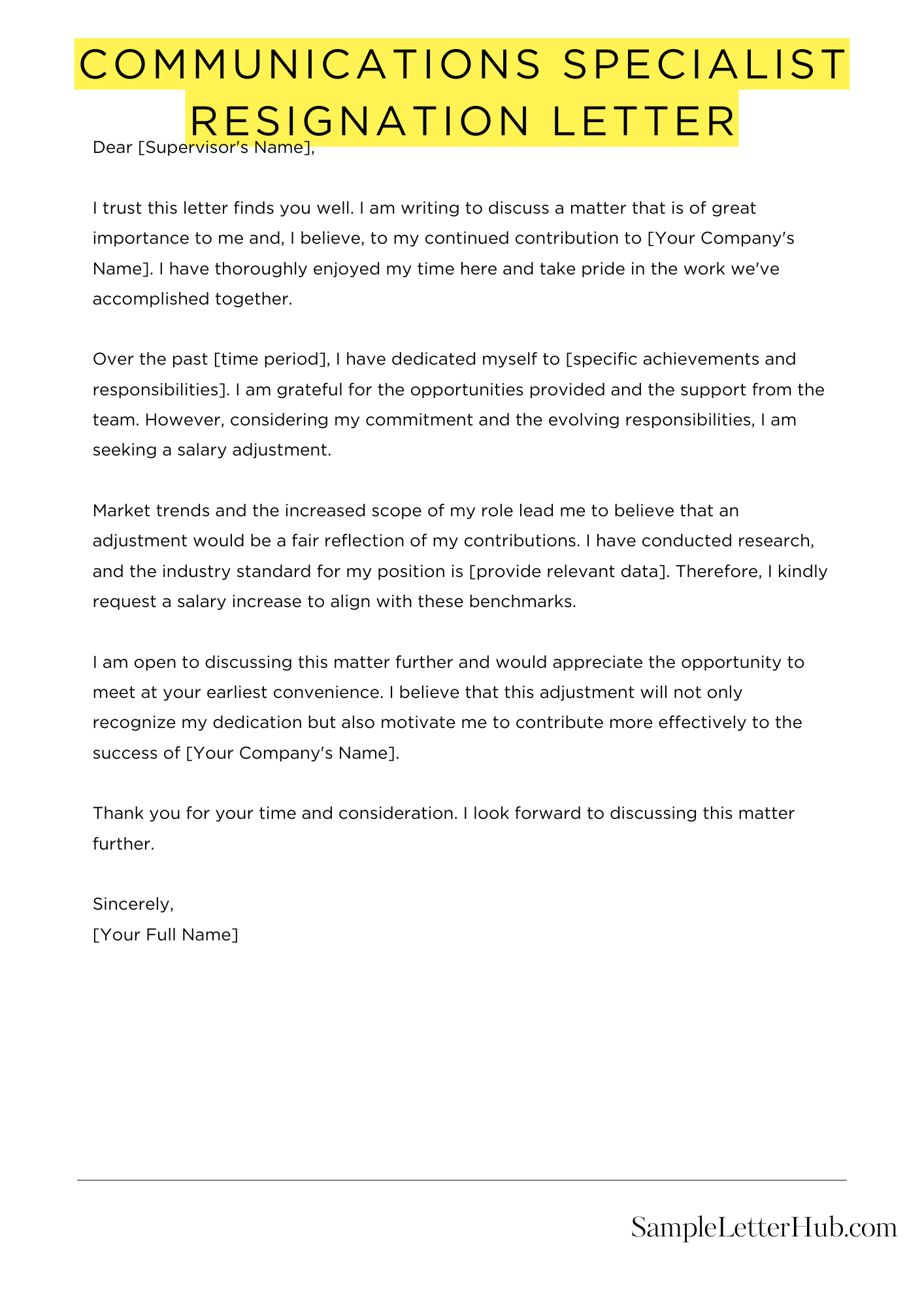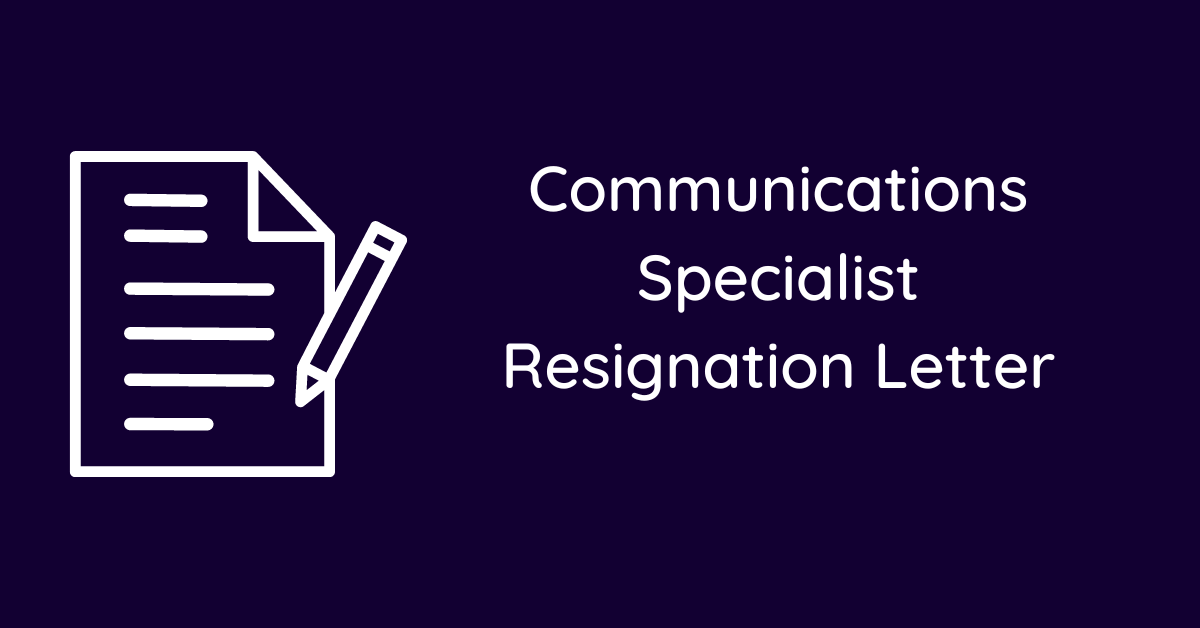When it comes to leaving a job, a clear and professional resignation letter is a must. It’s your chance to explain your decision to leave, thank your employer for the opportunity, and wish them well in the future.
Be polite and humble in your letter tone. Remember, you want to leave a good impression, even if you’re not happy with your job. Keep your letter brief and to the point, and avoid getting into any negative details.
Below, we’ve shared a template communications specialist resignation letter that you can use as inspiration. Feel free to adapt it to your own situation and needs.
Communications Specialist Resignation Letter
Dear [Recipient Name],
Please accept this letter as formal notification that I will be resigning from my position as Communications Specialist at [Company Name], effective two weeks from today, [Date].
During my time at [Company Name], I have valued the opportunities and experiences I have gained. I am grateful for the support and guidance I have received from my colleagues and supervisors.
I wish you and [Company Name] all the best in the future.
Sincerely,
[Your Signature]
Short Communications Specialist Resignation Letter Sample
Please accept this letter as formal notification that I am resigning from my position as Communications Specialist at [Company Name]. My last day of employment will be [Your Last Day]. Thank you for the opportunity to grow and learn during my time here. I wish you and the company continued success. I am happy to assist in the transition process to ensure a smooth handover of my responsibilities.
I wish you all the best with your communications specialist resignation letter.
When it’s time to say farewell, expressing your gratitude and best wishes can make the transition smoother:

How to Write a Communications Specialist Resignation Letter
1. Start with a Formal Introduction
Begin with a formal salutation, such as “Dear [Manager’s Name].” Clearly state your intention to resign from your position as a Communications Specialist, including the date your resignation will take effect.
2. Express Gratitude and Highlight Accomplishments
Take this opportunity to express your gratitude for the opportunities and experiences you’ve gained during your time with the company. Briefly highlight some of your key accomplishments and contributions to the team. This shows that you value the time you’ve spent there.
3. State Your Reasons for Leaving (Optional)
While it’s not necessary to provide a detailed explanation for your departure, you may choose to briefly state your reasons for leaving. This could include pursuing a new opportunity, seeking a different career path, or personal reasons. Be professional and respectful in your wording.
4. Offer Assistance with the Transition
Let your manager know that you’re willing to assist with the transition during your notice period. Offer to train your replacement or help with any ongoing projects. This shows that you’re committed to leaving the company on good terms.
5. End with a Positive Note
Close your letter with a positive and professional tone. Thank your manager again for the opportunity to work at the company and wish them and the team well in the future.
Communications Specialist Resignation Letter: 6 FAQs
When it comes to crafting a resignation letter for a Communications Specialist role, there are certain key questions that frequently arise. Here are the top 6 FAQs and their corresponding answers to help you navigate this process effectively:
1. What are the essential elements of a Communications Specialist resignation letter?
A well-written Communications Specialist resignation letter should include the following key elements:
- A clear statement of your intent to resign from your position
- Your last date of employment
- An expression of gratitude for the opportunity to work at the company
- A brief summary of your accomplishments and contributions
- A professional and courteous tone
2. How should I structure my resignation letter?
The structure of your resignation letter should be concise and professional. It should typically include the following sections:
- Header: Include your name, address, phone number, email address, and the date.
- Introduction: Begin with a formal salutation and a clear statement of your intent to resign.
- Body: Briefly summarize your key accomplishments and express your gratitude for the opportunity to work at the company.
- Closing: End with a polite and professional closing statement, such as “Sincerely” or “Best regards.”
3. What is the appropriate notice period for a Communications Specialist?
The customary notice period for a Communications Specialist is two weeks. However, it’s advisable to check your employment contract or company policy for specific guidelines.
4. Should I offer to help with the transition during my notice period?
Yes, it’s considered good practice to offer your assistance in ensuring a smooth transition during your notice period. This could involve training your replacement, documenting your responsibilities, or providing guidance to your colleagues.
5. What should I do if I’m not sure how to write my resignation letter?
If you’re unsure about how to write your resignation letter, you can seek guidance from a trusted mentor, career counselor, or human resources representative. They can provide valuable feedback and help you craft a professional and effective letter.
6. What are some common mistakes to avoid when writing a Communications Specialist resignation letter?
Some common mistakes to avoid when writing a Communications Specialist resignation letter include:
- Being vague or ambiguous about your intent to resign
- Including personal or negative comments
- Making demands or ultimatums
- Failing to proofread your letter carefully before submitting it
Before making the decision to resign from your job, it’s essential to consider the legal aspects:
Understanding your emotions after quitting your job is important. Explore why you might be feeling sad:
Related
- Resignation letter sample
- Forced resignation letter
- Resignation letter due to going abroad
- Resignation letter due to marriage
- Resignation letter due to other opportunity
- Resignation letter due to mistake

